新概念第二册第20课课件动名词的用法
逐句精讲新概念英语第二册:第20课独坐孤舟
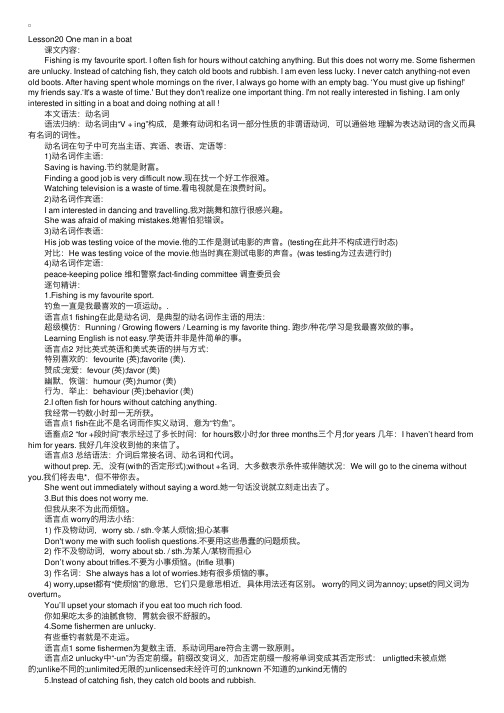
Lesson20 One man in a boat 课⽂内容: Fishing is my favourite sport. I often fish for hours without catching anything. But this does not worry me. Some fishermen are unlucky. Instead of catching fish, they catch old boots and rubbish. I am even less lucky. I never catch anything-not even old boots. After having spent whole mornings on the river, I always go home with an empty bag. ‘You must give up fishing!' my friends say.‘It's a waste of time.' But they don't realize one important thing. I'm not really interested in fishing. I am only interested in sitting in a boat and doing nothing at all ! 本⽂语法:动名词 语法归纳:动名词由“V + ing”构成,是兼有动词和名词⼀部分性质的⾮谓语动词,可以通俗地理解为表达动词的含义⽽具有名词的词性。
动名词在句⼦中可充当主语、宾语、表语、定语等: 1)动名词作主语: Saving is having.节约就是财富。
Finding a good job is very difficult now.现在找⼀个好⼯作很难。
Watching television is a waste of time.看电视就是在浪费时间。
新概念英语第二册:第20课课文详解及语法解析
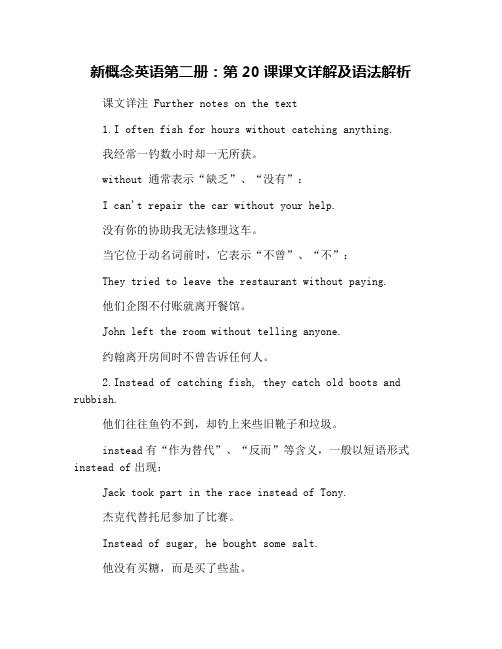
新概念英语第二册:第20课课文详解及语法解析课文详注 Further notes on the text1.I often fish for hours without catching anything.我经常一钓数小时却一无所获。
without 通常表示“缺乏”、“没有”:I can't repair the car without your help.没有你的协助我无法修理这车。
当它位于动名词前时,它表示“不曾”、“不”:They tried to leave the restaurant without paying.他们企图不付账就离开餐馆。
John left the room without telling anyone.约翰离开房间时不曾告诉任何人。
2.Instead of catching fish, they catch old boots and rubbish.他们往往鱼钓不到,却钓上来些旧靴子和垃圾。
instead有“作为替代”、“反而”等含义,一般以短语形式instead of出现:Jack took part in the race instead of Tony.杰克代替托尼参加了比赛。
Instead of sugar, he bought some salt.他没有买糖,而是买了些盐。
副词instead单独使用时一般出现在句尾:If you don't want a holiday in England, why don't you go to Australiainstead?如果你不想在英国度假,那你为什么不去澳大利亚呢?3.I am even less lucky.我的运气甚至还不及他们。
less是little的比较级,意为“不及”、“不如”、“更少”:Tom has got little chocolate, and Jack has got even less.汤姆只有一点儿巧克力,杰克则更少。
新概念第二册第二十课ppt课件

20
;.
boot n. 靴子
a pair of boots rubber boots 橡胶长靴 running shoes 跑鞋 tennis shoes 网球鞋 platform shoes 厚跟鞋 leather shoes 皮鞋 sandals 凉鞋 slipper 拖鞋 loafer 平底便鞋
5
;.
Fishing in snow
From hill to hill no bird in flight; From path to path no man in sight A lonely fisherman afloat Is fishing snow in lonely boat
Drink like a fish 牛饮
an odd fish 奇怪的家伙
19
;.
Fish vi. 捕鱼,钓鱼
I like fishing. = I enjoy fishing. = I am fond of fishing. = I am keen on fishing. (热衷于)
Go fishing / go swimming / go shopping Fish in troubled water 浑水摸鱼 fish for compliments 沽名钓誉
15
;.
★catch v. 抓到
vt. 捉住,逮住,捕获 catch – caught -caught The police have caught the thief. Have you caught any fish today? 赶上 We’ve just caught the train. 领会 I don’t catch your meaning.
新概念第二册第20课完整ppt课件

★fisherman n. 钓鱼人,渔民
fish→ fisherman (pl.fishermen) [注]不要忘了er哦 1)fish 鱼 (pl.) 单复数同形 They caught many fish that morning. 2)fishes 不同种类的鱼 He studies the fishes in the Indian Ocean
realize one's hope/dream/plan He realized his dream at last. →His dream was realized at last. come true 成为现实 (物作主语,无被动语态) Her dream has come true.
精选ppt
eg. The little boy was caught stealing apples from the
garden
精选ppt
The early bird catches the worm. 捷足先登。
catch it 被责骂,受处罚(口)(通常与will 等连用) If I come home late, I’ll catch it from my mother. catch up with 赶上,跟上 Go ahead please.I’ll soon catch up with you. catch phrase 标语,引人注意的句子
精选ppt
★realize v. 意识到
real adj.真的 → realize v.意识到→reality n.现实 1)认识到,意识到 (不用于被动语态,不用于进行时态,
人做主语。) realize one's mistake She realized that he was lying. 2) vt.实现(计划等)(可用于主动,也可用于被动)
新概念第二册件动名词的用法
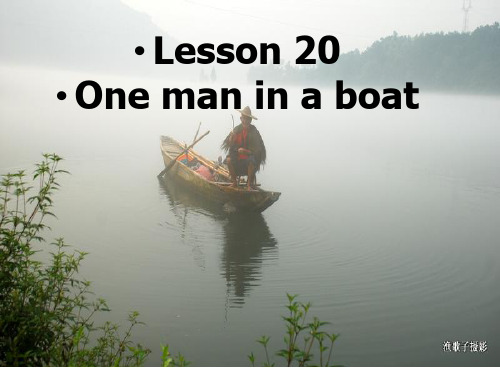
Do you like fishing?
a mean of relaxation and enjoying the peace of mind
【New words and expressions】
• catch • fisherman • boot • waste • realize
garbage (厨房里的)菜屑碎肉,残羹剩
肴,垃圾 (Am.)
I am even less lucky.
more/less lucky更加(不)幸运 less+原级 (消极比较级) A is less +原级 than B A不如B... 我没以前那么愉快。
I am less happy than before. 这个故事没那个有趣。
★waste vt./n. 浪费
1) waste vt.浪费 不要浪费你的时间、金钱和精力。
Don’t waste your time, money and energy.
2)waste n. 浪费 a waste of 对…的浪费
It is a waste of time/money/feeling/food.
捷足先登。 catch up with 赶上,跟上 Go ahead please.I’ll soon catch up with you.
★fisherman n. 钓鱼人,渔民
fish→ fisherman (pl.fishermen)
1)fish 鱼 (pl.) 单复数同形 2)fishes 不同种类的鱼 He studies the fishes in the
★realize v. 意识到
新概念二第20课课件

钓鱼是他的爱好。
He is fishing.
_F_is_h__i_n_g_ is his hobby. fishing n. 钓鱼
It’s a fish.
What’s it?
fish n. 鱼
They are fish. fish-fish(复数) (表示同种类鱼)
What are they?
They are fishes.
(un)luckily (adv.)
Instead of catching fish, they catch old boots
and rubbish.
instead of (sth./ doing sth.)
代替,而不是 (介词短语)
I am even less luckyin. stead (adv.) 代替,而是
染上感冒
catch fire
着火
catch one’s eyes / attention
吸引某人注意力
3 realize
realize v. 意识到
他意识到努力学习的重要性。 He r_e_a__li_z_e_d_ the importance of studying hard.
realize v. 实现
Lesson 20
One man in a boat
独坐孤舟
语法 (动名词)
Part 1
1 fisherman A fisherman. Who is he?
fisherman -fishermen n. 钓鱼人,渔民
fish v. 钓鱼 fish-fishing What is he doing?
n. 废品
5 boot
boot n. 靴子
新概念英语第二册:第20课课文详解及语法解析
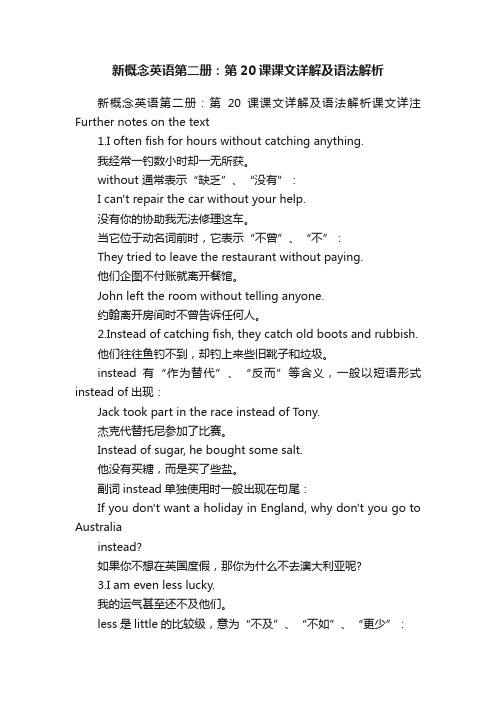
新概念英语第二册:第20课课文详解及语法解析新概念英语第二册:第20课课文详解及语法解析课文详注Further notes on the text1.I often fish for hours without catching anything.我经常一钓数小时却一无所获。
without 通常表示“缺乏”、“没有”:I can't repair the car without your help.没有你的协助我无法修理这车。
当它位于动名词前时,它表示“不曾”、“不”:They tried to leave the restaurant without paying.他们企图不付账就离开餐馆。
John left the room without telling anyone.约翰离开房间时不曾告诉任何人。
2.Instead of catching fish, they catch old boots and rubbish.他们往往鱼钓不到,却钓上来些旧靴子和垃圾。
instead有“作为替代”、“反而”等含义,一般以短语形式instead of出现:Jack took part in the race instead of Tony.杰克代替托尼参加了比赛。
Instead of sugar, he bought some salt.他没有买糖,而是买了些盐。
副词instead单独使用时一般出现在句尾:If you don't want a holiday in England, why don't you go to Australiainstead?如果你不想在英国度假,那你为什么不去澳大利亚呢?3.I am even less lucky.我的运气甚至还不及他们。
less是little的比较级,意为“不及”、“不如”、“更少”:Tom has got little chocolate, and Jack has got even less.汤姆只有一点儿巧克力,杰克则更少。
新概念第二册 Lesson 20 One man in a boat (动名词)
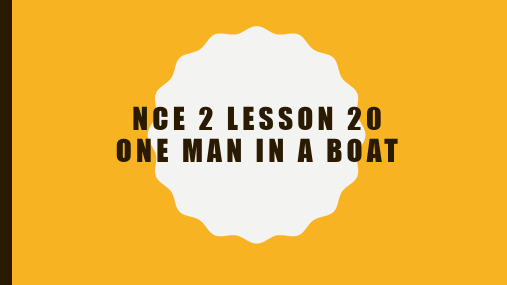
JOIN THESE PAIRS OF SENTENCES WITH THE WORDS GIVEN IN PARENTHESE. MAKE ANY OTHER NECESSARY CHANGES. 用括号里对词来连接下列句子,如需要可对原句进行必要的改动。
1. He went out of the restaurant. (without) He did not pay the bill. He went out of the restaurant without paying the bill.
boot /buːt/ n. 靴子
CATCH
catch /kætʃ/ v. 抓到 E.g. Tom, catch the baseball. 汤姆,抓住棒球⚾️。
FISHERMAN
fisherman /ˈfɪʃə(r)mən/ n. 钓鱼 人,渔民 E.g. He is a fisherman 他是渔民。
wastewater 废水 solid waste固体废弃物 What a waste! 真浪费啊。
REALIZE
realize /'ri:əlaɪz/ v. 意识到 E.g. When I was ready to go to school, I realized that today is Saturday. 当我准备好要去上学时,我意识到今天是周六。
WHY IS FISHING THE WRITER’S FAVORITE SPORT?
TEXT
Fishing is my favorite sport. I often fish for hours without catching anything. But this does not worry me. Some fishermen are unlucky. Instead of catching fish, they catch old boots and rubbish. I am even less lucky. I never catch anything-not even old boots. After having spent whole mornings on the river, I always go home with an empty bag. ‘You must give up fishing!’ my friends say. ‘It’s a waste of time.’ But they don’t realize one important thing. I’m not really interested in fishing. I am only interested in sitting in a boat and doing nothing at all!
- 1、下载文档前请自行甄别文档内容的完整性,平台不提供额外的编辑、内容补充、找答案等附加服务。
- 2、"仅部分预览"的文档,不可在线预览部分如存在完整性等问题,可反馈申请退款(可完整预览的文档不适用该条件!)。
- 3、如文档侵犯您的权益,请联系客服反馈,我们会尽快为您处理(人工客服工作时间:9:00-18:30)。
I never catch anything—not even old boots. After having spent whole mornings on the river, I always go home with an empty bag. after(conj.)+从句,从句主语必须是主句的主 语才能换成下面一种形式 after(prep.)+名词/动词的ing形式 After I go to school,I learned a lot of knowledge. After going to school,I learned a lot of knowledge. After the students handed in their papers, the teacher left.
rubbish n. 垃圾
a pile of rubbish 一堆垃圾 garbage (厨房里的)菜屑碎肉,残羹剩 肴,垃圾 (Am.)
I am even less lucky.
more/less lucky更加(不)幸运 less+原级 (消极比较级) A is less +原级 than B A不如B... 我没以前那么愉快。 I am less happy than before. 这个故事没那个有趣。 This story is less interesting than that one. not so/as ...as 不及,不如 I am not so happy as before. This story is not so interestin词的不同含义★
• ①stop to do:停下正在做的事去做另一件事 stop doing:停下正在做的事 • ②remember to do:记得要去做某事 remember doing:记得做过某事 • ③forget to do:忘记去做某事 forget doing:忘记做过某事 • ④go on to do:继续去做另一件事 go on doing:继续做未完成的这件事
• v. 抓到 • n. 钓鱼人,渔民 • n. 靴子 • n. 浪费 • v. 意识到
★catch v. 抓到 (caught;caught)
catch fish, catch a thief catch the bus ----- miss the bus catch a cold 染上感冒(动作) The early bird catches the worm. 捷足先登。 catch up with 赶上,跟上 Go ahead please.I’ll soon catch up with you.
• Lesson 20 • One man in a boat
Do you like fishing?
a mean of relaxation and enjoying the peace of mind
【New words and expressions】
• catch • fisherman • boot • waste • realize
1)认识到,意识到 (不用于被动语态,不用于 进行时态,人做主语。) realize one's mistake 2) vt.实现(计划等)(可用主动,被动) realize one's hope/dream/plan 他最终实现了自己的梦想。 He realized his dream at last. →His dream was realized at last. come true 成为现实 (物作主语,无被动语态) Her dream has come true.
★fisherman n. 钓鱼人,渔民
fish→ fisherman (pl.fishermen) 1)fish 鱼 (pl.) 单复数同形 2)fishes 不同种类的鱼 He studies the fishes in the Indian Ocean
fries fish 煎鱼,炸鱼 fresh fish salted fish fish-and-chips 油煎鱼加炸马铃薯片(大众快餐) fish v. 钓鱼 go fishing/swimming/shopping
★boot n. 靴子 a pair of boots boots 长筒靴 running shoes 跑鞋 tennis shoes 网球鞋 leather shoes 皮鞋 sandles ['sæ ndl] 凉鞋 slippers 拖鞋 sneakers ['sni:kə] 运动鞋
★waste vt./n. 浪费
1) waste vt.浪费 不要浪费你的时间、金钱和精力。 Don’t waste your time, money and energy. 2)waste n. 浪费 a waste of 对…的浪费 It is a waste of time/money/feeling/food.
★realize v. 意识到
• ⑤try to do:尽力去做某事 try doing:试着做某事 • ⑥regret to do: • 对马上要做的事表示遗憾 regret doing: 对已做过的事表示后悔 • ⑦mean to do:打算去做某事 • mean doing:意味着怎样
练习题: 用括号内动词的适当形式填空: 1._______ Listening (listen) to pop music is something he enjoys. finishing (finish) the work. 2.The workers left after ________ 3.After __________________ having spent/spending (spend) the money, he wrote to his father. 4.You should apologize to your teacher for ______ coming (come) late. 5.We can learn how to write by ______ reading (read). 6.Don’t be afraid of ______ asking (ask) questions. 7.Are you interested in playing ______ (play) volleyball? 8.He left home without locking ______(lock) the door.
But this does not worry me. worry v. 使…担心 worry about sb.为某人感到担心 be worried about 对…感到担心 我为我的小女儿感到担心。 I was worried about my little daughter.
Some fishermen are unlucky. Instead of catching fish, they catch old boots and rubbish. instead of 而不是(可置于句首或句尾) 我去上学了而不是呆在家里。 I went to school instead of staying at home. 我买了书而不是买裙子。 I bought books instead of buying dresses. instead of +n./ pron./v.-ing
9._________ Teaching (teach) English is my job. walking (walk) in rain? 10.Why does he enjoy________ 11.He apologized for _________ not handing(not hand) in the homework on time. 12.Instead of ________ going (go) to see a doctor, he lay in bed and had a sleep. 13.I stayed in bed all day instead of ________ going (go) to work. 14.A lot of men have given up _________(wear) hats. wearing 15.She is very interested in ________ dancing (dance). 16.On _______ entering (enter) the room, he turned on the light.
3) V-ing形式作宾语 a.) She sat there without speaking. b.) David is interested in driving. c.) Do you mind turning on the TV? d.)Betty enjoys listening to pop music. 4)动名词做定语 a reading room 阅览室 a dining room 餐厅「 a swimming pool 游泳池 a sleeping car 火车的卧铺车厢
Key structures —动名词(V-ing) 1)动名词是动词的一种非谓语形式; 仍旧是动词,但是不做谓语 2)v.+ing形式; 3) 它在句中其名词的作用,可单独 或引起短语 作主语,表语,动词宾语,或介词 的宾语以及定语。)
Subject
1) V-ing 形式(动名词)作主语 往往表示 抽象、笼统的动作或泛指某动作或行为。 如:
【课文讲解】 Fishing is my favourite sport. 动词+ing(动名词):1.做主语; I often fish for hours without catching anything. without prep. 没有 (可放句首,句尾) prep + n./v.-ing/pron. He went out and he didn’t say anything. He went out without saying anything.
